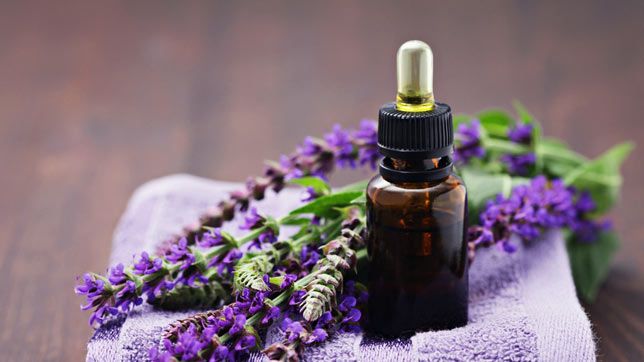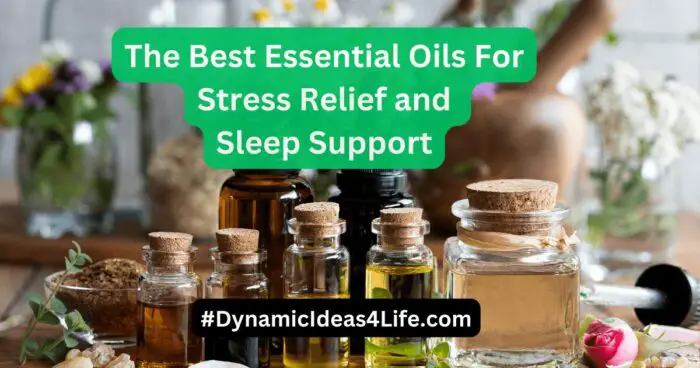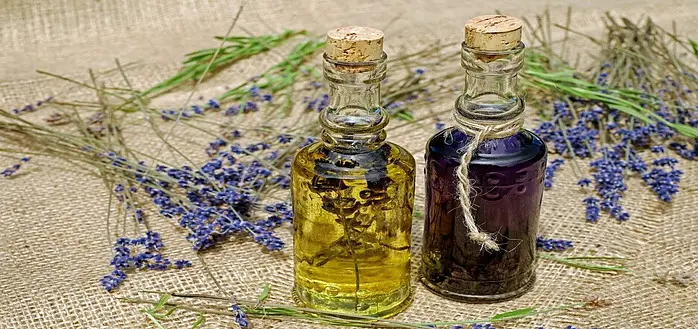My initial journey into the realm of aromatherapy wasn’t one I entered into lightly. I was initially skeptical about this idea of healing, but once I saw research supporting the use of Essential Oils for Relaxation and Sleep, my curiosity was instantly piqued to learn more.
What I discovered was a world where science and senses intertwine. Essential oils speak directly to the part of our brains that processes emotion and stress.
I heard this before but never realized how true this seemingly was.
Consider the bridge between inhalation and emotions – the olfactory system. When we inhale the molecules inside essential oils, they engage receptors in the nose that send messages through the olfactory bulb to the limbic system.
This brain region is a headquarters for emotional activity. It’s also involved in governing physiological responses, such as heart rate and stress levels, which can have a significant effect on our relaxation and sleep patterns. Which is what I would like to delve into deeper…
Essential Oils For Relaxation And Sleep

What struck me about this all was how the power of something as delicate as a scent impacting the nervous system, which encompasses both the sympathetic ‘fight or flight’ and the parasympathetic ‘rest and digest’ responses could actually affect my brain activity.
What I found was that with the right essential oils, we can encourage our bodies towards the latter – paving the way for improved relaxation and more restful sleep.
Although, what I also found was that not all essential oils are created equal when it comes to aiding relaxation. Some are much more suitable. Exactly what you’ll see in the upcoming section, where I’ll share the stars of sleep support, the essential oils that have consistently risen to the top in both anecdotal accounts and scientific studies.
Slumber Scent-Sations: Top Essential Oils for Better Sleep and Stress Relief
When night falls and sleep eludes, essential oils may be your silent partners in crime against restlessness. Lavender, with its soft, herbal embrace, has a near-universarial reputation for sending insomniacs into the arms of Morpheus.
Boasting more than just a pleasant scent, its compounds interact with the brain to encourage sedation.
Chamomile, often found in soothing teas, isn’t just for sipping. It’s a gentle caress for the restless mind when used as an essential oil. Infusing your bedroom with its apple-like aroma has been known to nudge even the toughest cases toward a peaceful slumber.
A citrus burst might seem counterintuitive for sleep, but Bergamot defies expectations. It’s like a stress eraser, scrubbing away the day’s worries, preparing mind and body for sleep without causing drowsiness during daylight.
Then there’s Sandalwood, with its earthy and rich notes, that has been a go-to for meditation and spiritual rituals for eons. When used sparingly, it grounds you, drawing a line under your daytime anxieties and priming you for a restful night ahead.
And, don’t overlook Vetiver, an oil with a woody depth that’s as mysterious as it is effective. A few drops might be all you need to sink serenely into a dream state, proving that some sleep aids don’t come in bottles with prescription labels.
Incorporating these essential oils into a night-time routine can be transformative. Consider this the starting line toward a personal sleep revolution, where taking the reins on rest isn’t just possible – it’s a delight.
Creating Your Sleep Sanctuary: A Guide to Essential Oil Blends
Your bedroom should be an oasis of tranquillity. A strategic blend of essential oils can transform any ordinary room into a sleep sanctuary. Combining oils not only multiplies the benefits but also allows you to personalize the aroma to suit your preferences.
Here’s how to craft that perfect ambience.
The synergy between certain oils can create a more potent relaxation effect. For instance, mixing lavender and chamomile accentuates the calming qualities, potentially easing you into deeper stages of sleep more swiftly. And with a touch of bergamot this adds a freshness that can further help alleviate stress or anxiety.
If you’re ready to experiment, give these blends a try:
- Four drops of lavender,
- two drops of chamomile, and
- one drop of bergamot is a classic blend.
Another combination involves;
Equal parts sandalwood, vetiver, and bergamot, which might be ideal for those who favour earthy tones and citrus notes.
The important thing is to start with fewer drops and adjust based on how your body responds.
Making your own pillow sprays with these blends is simple. Start with a small spray bottle, mix distilled water with a little witch hazel or alcohol, then add your oils. This can create a mist that is not only soothing but also convenient to use before bed.
Similarly, a homemade balm using shea butter or coconut oil as a base can be massaged into pressure points, releasing the essential oils’ properties right where you need them.
The How-To of Aromatherapy: Essential Oil Applications for Rest
Choosing the right application method is crucial to reaping the benefits of essential oils for rest. Whether you�re drawn to diffusers, roll-ons, or personal inhalers, each method has its advantages.
For instance, diffusers disperse oils into the air, creating a calming environment across the entire room. It’s ESSENTIAL to use them in a well-ventilated area to prevent overwhelming the senses.
On the other hand, roll-ons are perfect for targeted application, providing a more personal and controlled experience, a gentle swipe across your temples or wrists can ease you into slumber.
While oils are powerful on their own, combining them with other relaxation methods can amplify their effects. For those nights when sleep seems elusive, try pairing lavender or chamomile oil with meditation or controlled breathing exercises.
This multi-sensory approach can guide your body towards relaxation more effectively than using either technique in isolation.
Your pre-sleep routine is a personal ritual; incorporating essential oils into it can mark the transition from day to night. Begin with a slow, drawn-out process of selecting your oil, preparing your diffuser, or applying your roll-on.
As scent fills the room or lingers on your skin, allow yourself to mentally drift away from daytime worries.
With essential oils, moderation is key. Overexposure can lead to desensitization or even adverse effects, such as headaches.
To maintain their special allure, save these scents for the hour before bedtime. This helps your brain associate them with sleep readiness. The ideal practice involves using essential oils for a maximum of thirty minutes before sleep. This duration gives enough time for the oils to work their magic without overwhelming your olfactory system.
Beyond the Hype: Real Stories of Transformation with Essential Oils
I understand peoples skepticism when it comes to aromatherapy. With so much buzz around essential oils, you might wonder, do they really work or is it all placebo?
To answer this, I turned to real people who’ve experienced their benefits first-hand.
Take Sarah, for example, a night-shift nurse with a chaotic sleep schedule. She swears by lavender oil to help her unwind. ‘It’s like a switch flips in my brain, and I can finally relax,’ she shared.
Then there’s Michael, a father of two young kids. He finds a blend of chamomile and vetiver essential oils indispensable in their bedtime routine. ‘Our evenings transformed from battles into peaceful wind-downs,’ he revealed.
Of course, experts have their say too.
A sleep specialist I spoke with highlighted studies showing reduced anxiety and improved sleep quality in patients using essential oils.
Addressing the skepticism, it’s vital to distinguish genuine effects from the placebo. Sure, believing in a treatment’s power can influence outcomes, but the consistent, positive feedback on essential oils, backed by emerging research, suggests there’s more to it.
As we shift focus from anecdotal evidence to empirical research in the next section, keep these stories in mind.
They remind us that, behind the science, there are personal journeys of people finding solace and better sleep, thanks in part to the nature’s extracts they inhale before bedtime.
Sourcing and Sustainability: Choosing Quality Essential Oils
I place great significance on the purity and quality of essential oils, particularly when their purpose is therapeutic. When I consider the market’s offerings, I place those with certifiable purity at the top of my list. Let me share with you why this matters.
When it comes to organic versus non-organic essential oils, the debate is lively. Organic oils are often championed for their lack of pesticides, but whether they offer superior efficacy for relaxation and sleep is a topic still under exploration.
I recommend you focus on the purity of the oil and its sourcing.
The ethical considerations also weigh heavily on my mind. The production of essential oils should not come at the expense of our environment or exploit labour.
Sustainable and ethical sourcing practices are vital, ensuring that we can enjoy these oils with a clear conscience. It is comforting to know that the enjoyment of our favourite scents does no harm.
In the age of clever marketing, verifying the authenticity of essential oils is crucial. Some oil labels can be misleading, leaving you with a less effective product. I urge you to look for third-party certifications or batch-specific reports that attest to the oil’s composition.
Whether you’re new to essential oils or a seasoned user, your selection process plays a crucial role in achieving the relaxation and sleep benefits you seek.
Opting for high-quality, sustainably sourced oils is not only a choice for personal health but also an investment in the health of our planet.
In Conclusion
Dealing with Stress and Not Being Able To Sleep at night (or generally) is unfortunately for many a very real problem. There are different things you can try such as supplements, lifestyle changes and even music!
*Binaural Beats for sleep and Relaxation Music work surprisingly well!
However, Essential Oils The Best Essential Oils For Relaxation And Sleep Support are a good idea for something else to try. Lavender, Chamomile, Bergamot, Sandalwood and Vetiver are for us the main ones but there are 100’s of different oils used in Aromatherapy.
I shall finish this article up here but for those interested something else I will share is where you can get good quality essential oils from…
Where To Buy Essential Oils
After doing some quick research on some popular sites to check out for quality essential oils online. I found five brands to take a look at.
I haven’t tried every product here. There are 100’s to choose from. Guru Nanda is my personal choice but it’s worth having a shop around. The Ayurveda Experience is the more specialized areas such as skincare, eyes and hair. I don’t see any products especially for sleep and relaxation.
Amirita, and Rocky Mountain Oils are the 2 with the most different Essential Oils available. Check out these two and Guru Nandu to see what they have for sale.




Anxiety and Depression best ways to lower blood sugar BiOptimizers blood pressure supplements blood sugar support supplements Digestive Enzymes Supplement digital products Dr Sam Robbins Erectile dysfunction Exercise Gut Health Healthy Living heart health HFL how to lower blood sugar levels How To Lower Cholesterol insulin resistance joint health supplement Keto keto dieting Keto Diet Weight Loss leaky gut supplements leptin resistance list Magnesium deficiency Matt Gallant mental health multivitamins Nootropics nutrient supplements Probiotics Probiotic Supplements proteolytic enzymes reverse type 2 diabetes stress and anxiety stress relief vitabalance vitapost Wade Lightheart weight loss articles weight loss diet plans weight loss product reviews weight loss supplements weight loss supplements that work weight loss tea


